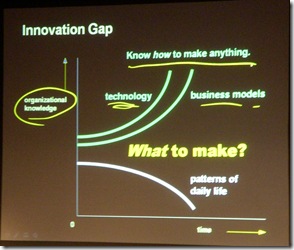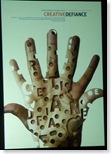DesignThinkers 2007 Thoughts 2
In my previous DesignThinkers post, I gave an overview of my experience at the DesignThinkers 2007 conference. In this post, I'll highlight some of my favorite sessions from the conference.
How do we adapt to the shift from a push to a pull economy? Keynote by Patrick Whitney
 Patrick talked about the push and pull economy model and how companies can use innovative design and adjust business strategies to adapt the new economy model. On the traditional Push model, the producers are in power and consumers had little choice. In the Pull model, consumers are asking "Give me what I want, when I want it, and way I want it and much cheaper..." In the past, business focused on operations, efficient use of factories, and economy of scale; and design focused on styling, segmentation, and design for manufacturing. Now, we have more advanced technology and highly structured business models, many companies are capable to make anything. However, they are unsure about what to make and how to win. Design shifted from manufacturing products to user experience, speed, and systems. The image on the left shows the innovation gap that producers are facing today. Patrick offers suggestions on the business strategy: when future is not clear and changes fast, options are more important than optimizing. In terms of design, we need to develop methods as rigorous as those in the rest of the company.
Patrick talked about the push and pull economy model and how companies can use innovative design and adjust business strategies to adapt the new economy model. On the traditional Push model, the producers are in power and consumers had little choice. In the Pull model, consumers are asking "Give me what I want, when I want it, and way I want it and much cheaper..." In the past, business focused on operations, efficient use of factories, and economy of scale; and design focused on styling, segmentation, and design for manufacturing. Now, we have more advanced technology and highly structured business models, many companies are capable to make anything. However, they are unsure about what to make and how to win. Design shifted from manufacturing products to user experience, speed, and systems. The image on the left shows the innovation gap that producers are facing today. Patrick offers suggestions on the business strategy: when future is not clear and changes fast, options are more important than optimizing. In terms of design, we need to develop methods as rigorous as those in the rest of the company.
Patrick Whitney is Director of the Institute of Design, Illinois Institute of Technology and a Professor of Design.
Can culture trump consumer? by Colin Drummond
In Colin's talk, there are great examples of how smart advertisements can change consumer culture. In the IKEA furniture example, the creative group tries to change people's view about furniture and encourage them to buy new furniture. The ad captures people's emotion of feeling sorry about a lamp since it was thrown away and left alone in the rain by its owner. Then, the famously IKEA spoke person comes out points out it's silly to feel for a lamp since it's just like old clothes you throw away without hesitation. Smart and funny. Not sure if I'll throw away old furniture as easily as my old clothes, but I'll definitely think IKEA when I buy furniture and remember the ad. The second movie below is a Burger King you've probably seen many times on TV like me, but I didn't know the creation story behind the ad till the talk. The main theme of the ad is Burger King's tag line "Have it your way!" The ad was created when there was a big diet culture/perception shift in the US. Fast food is bad, and Burger King is among the worst fast food you can buy. A lot of people were buying more and more organic food. Burger King were losing many customers. In the ad, the creative group tries to show that Bruger King is comfort food, you can eat the way you want it - freedom, feeds the hungry man - satisfaction. Interestingly, the ad did very well in multiple cultures (Japan, Germany, and England).
Colin Drummond is Group Director, Cognitive & Cultural Studies, at Crispin Porter + Bogusky.
Can design effect change? by Chaz Maviyane-Davies
 A picture worth a thousand words. This is definitely true for Chaz's work. His presentations is a visual essay of his creativity and belief. He uses images and ideas to raise people's consciousness about an array of social issues including human rights, health and the environment. Very powerful post illustrations! I highly recommend you to check out his website: www.maviyane.com.
A picture worth a thousand words. This is definitely true for Chaz's work. His presentations is a visual essay of his creativity and belief. He uses images and ideas to raise people's consciousness about an array of social issues including human rights, health and the environment. Very powerful post illustrations! I highly recommend you to check out his website: www.maviyane.com.
Chaz Maviyane-Davies has been described by the UK’s Design magazine as “the guerrilla of graphic design”. He is presently a Professor at the Massachusetts College of Art.
Technorati Tags: DesignThinkers2007
Comments
Anonymous
October 28, 2007
PingBack from http://msdnrss.thecoderblogs.com/2007/10/29/designthinkers-2007-thoughts-2-2/Anonymous
November 01, 2007
This is a great insight into some of the presentations at Design Thinkers. Thanks for sharing.Anonymous
September 18, 2008
Similar to last year , I'm filling up my calendar with upcoming UX conferences and activities. Here's